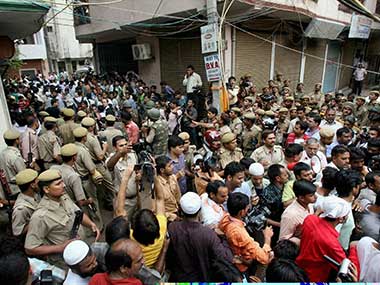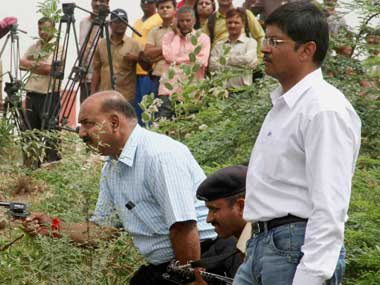[caption id=“attachment_989237” align=“alignleft” width=“380”]  Police and crowds during the 2008 shootout at Batla House. PTI[/caption] No profession of our times will be respected or acquire high standards of excellence unless it is willing to learn from experience, particularly its mistakes. A capacity to adapt itself to changing needs of society is the hallmark of any vital public service like the police. And by this test it is my perception that the Indian Police will get a score of only 6 out of an achievable 10. This is why both Ishrat Jahan and Batla House episodes assume great significance. They will have to be studied seriously by all ranks. It is the sacred duty of the higher echelons of the police to instruct the lower ranks, including the Constabulary (who account for about 85 percent of the whole of the Indian Police), on what the salient features of the two happenings are and what lessons one could draw from them so that field work gains qualitatively. The most ardent admirer of the police will concede that no force is perfect or totally honest, and it has necessarily to be constantly conscious of pitfalls on its way. Talking of specifics, the two cases are studies in contrast, despite their certain commonalities. Both were ‘encounters’, a terminology that is difficult to explain to international audiences. The expression is sufficiently dubious and annoying if not obnoxious. Worse is the celebration of the so-called ‘encounter specialists’, who evoke the image of rogue police officers and who enjoy the licence of their senior officers as well as the State in indulging in wanton killings. The two episodes should convince the police that they don’t enjoy any carte blanche, and are definitely accountable to the law. This is why there is a case for level-headedness in combating terrorism and its offshoot. I am not willing to buy the theory that terrorism can be fought only with the weapon of extra-judicial killings. There are equally tough ways. Guantanamo Bay may have become a metaphor for arbitrariness. But it has been found to be an effective tool for handling suspects and submitting themselves to a process of scrutiny by military tribunals, which are possibly less judicial than regular courts. This is just a thought that needs to be pondered. It may revive memories of TADA and special tribunals. But is there any other way, we can contain terrorist designs? In Ishrat Jahan’s case, the CBI investigation –even giving concession to a possible extraneous factor of political interference- has undisputedly revealed deliberate killings, with or without malice. But Batla House was in all probability an unplanned and therefore unscheduled operation leading to the unfortunate death of a prized police officer who died in harness. (Trivializing this loss to the police – as some public figures have done tendentiously- is painful, to say the least.). There is not even a remote suggestion that Batla House was the result of a political direction, an extenuating factor which does not apply to Ishrat Jahan. The verdict is out in the Batla House case, while Ishat Jahan’s case is yet to be decided in Court. This is why I feel there need not be any inhibition in discussing the role of the police in the Batla House case, while in Ishrat Jahan’s case - however much the facts point to a massive cover-up -we need a little more restraint, so that there is no accusation later of a trial by media. [caption id=“attachment_989239” align=“alignleft” width=“380”]  Police officials during a reconstruction of the Ishrat Jahan shootout. PTI[/caption] The Batla House incident was a straightforward operation in which the role of intelligence was somewhat muted. At least there is no allegation that the Delhi Police was led by the nose by the IB. In Ishrat Jahan’s case there is a strong suspicion of an IB hand (in an absolutely benign manner, and actuated purely by considerations of national security). If the operation went awry it was the Gujarat Police that had to bear the cross. It was for the latter to accept or reject the IB information or advice, and not blame that hallowed organization or seek shelter under it. In contrast the Delhi Police accepts its responsibility and does not run away from accountability. I must compliment the outgoing Delhi Police Commissioner for the clinical stand he has taken. He cannot be arraigned merely because he says that any further calumny poured on the Delhi Police would demoralize his men. No Chief of Police can take any other stand. His reluctance to enter into a slanging match with the political class, especially on whether there should be a dialogue with regard to a judicial enquiry, is very much in order. This brings me to the subject of a demand for a judicial probe, even after the trial court has given its verdict. There are people who are sticking to this clamour even post-judgement. They are entitled to do this. Let us not question their right or motive. But it must be remembered that a judicial enquiry will succeed only in raising more new issues than throw light on existing ones. Such an outcome will not merely stop with a scrutiny of only police processes. It would dilute the already fragile credibility of the lower judiciary. As long those who demand a judicial enquiry have no information assailing the integrity or objectivity of the trial judge, I think it is unfair to press for the same. The prosecution story in the case may have several holes. (No prosecuting agency is perfect or is clinically efficient or objective.) I am sure the defence side in the Batla House case had an untrammeled opportunity to highlight them during the hearing. It has yet another opportunity when it goes on an appeal to the Delhi High Court. Thereafter there is the highest forum in the country. The Supreme Court has shown an open mind in willing to hear those aggrieved with the lower Courts. This is enough guarantee that the convicted Batla House case accused will have justice done to them. Finally, a few points to ponder for the police in the whole country. There is no point in complaining about politicians. The latter have a role to play in a vibrant democracy like ours. This is why the charge that both Ishrat Jahan and Batla House cases have been highly politicized does not excite me. If there were no politics in these episodes in a country that is divided so sharply, I would have been surprised. The police will need to learn to cope with this phenomenon. This is what I find is happening to the police in the UK, and the police have started adapting themselves to the realities, without succumbing to pressures of the polity. In my view the Ishrat Jahan and Batla House episodes have the positive impact of telling the police that their operations will remain under severe scrutiny, sometimes benign and well motivated, and sometimes malicious. Fundamental to this is the need for circumspection and an honesty of purpose on the part of the police. If you are transparent in record keeping you will have little to bother by way of scrutiny. Honesty is therefore still the best policy! The writer is a former CBI Director.
In my view the Ishrat Jahan and Batla House episodes have the positive impact on the nation’s police forces.
Advertisement
End of Article
Written by RK Raghavan
RK Raghavan is a former director of Central Bureau of Investigation and a former joint director of the Intelligence Bureau, New Delhi see more


)

)
)
)
)
)
)
)
)



